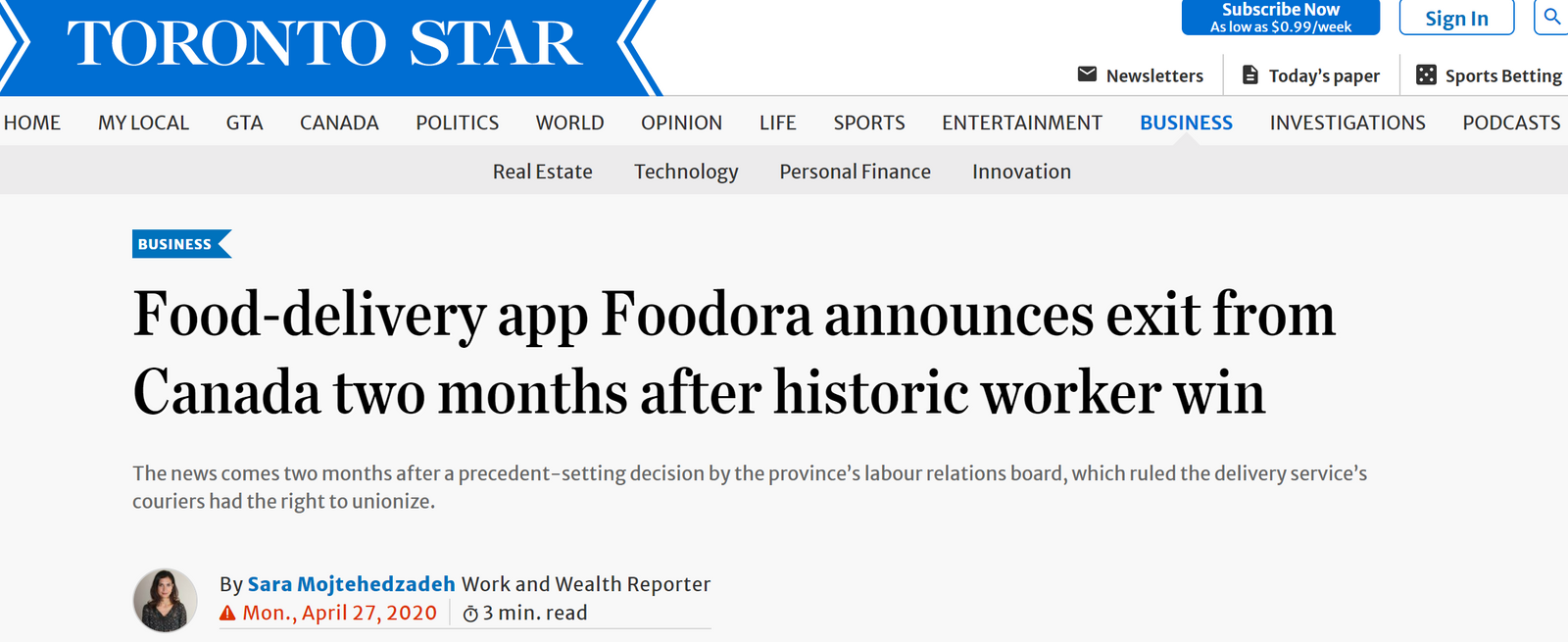Oavsedda konsekvenser 7: Foodoras matkurirer i Kanada får rätt att ses som anställda och bilda fackförening - varpå företaget lämnar landet.
Februari 2020: Goda nyheter för det så kallade prekariatet och gigarbetare i Kanada kablas ut: Foodoras matkurirer måste betraktas som anställda och har rätt att bilda fackföreningar!
The Ontario Labour Relations Board has ruled that Foodora couriers are dependent contractors of the food-delivery company, clearing a hurdle towards potential unionization and setting a major precedent for other workers in the gig economy

April 2020: Foodora meddelar att de lämnar Kanada. De säger emellertid inte rakt ut att det beror på domen ovan - från The Toronto Star:
App-based food-delivery giant Foodora is shuttering its Canadian operations, citing the "highly competitive and saturated Canadian environment" in an email sent to couriers Monday.
Många som stred för arbetarnas villkor är dock minst sagt förvånade och besvikna:
Foodora, the popular meal delivery app, is declaring bankruptcy and leaving the Canadian market next month. This, even while the demand for meal deliveries has arguably never been higher. The timing of the announcement is raising eyebrows with labour activists, as Foodora’s couriers have only recently won the right to unionize from Ontario’s labour relations board.

November 2021: En artikel publiceras i Critical Sociology som konstaterar att de som drabbades mest av att Foodora lämnade Kanada, var de med sämst ställning på arbetsmarknaden. Artikeln bygger på intervjuer med faktiska fd Foodora-giggare i Kanada. Här är ett exempel:
Some interviewees chose to work for Foodora because they had no better alternative. An example was Megan, a 51-year-old single mom with three children. With a lack of work experience for many years in addition to poor credit, working for Foodora was one of her only options after ending a long legal battle to divorce her ex-husband:
I started working in November for Foodora because I just wanted to look up online, like I knew I had already applied for over 300 jobs. So, when I was [staying] at my cousin’s house, I thought, ‘Okay, I have almost no resume, my reputation’s probably already been destroyed with all the companies that are in my field of study that I’ve been trained in and studied’. So, I just got to find a job that doesn’t do like interviews, stringent background checks and interviews and all that jazz.
Since Foodora exited, Megan has worked at various delivery companies as a gig worker and sub-contract courier, with even worse working conditions and lower wages.
De som hade giggandet som sidoinkomst klarade sig betydligt bättre:
Daniel was 29 years old and in the entertainment industry. He had started delivery work when he was a graduate student. He emphasized that he ‘never needed the money’ from delivery and said, ‘If I’m being honest, especially during the pandemic, it is purely just to get out of the house, like physical activity’. Sharing a similar love of biking, Bianca was a 33-year-old lab facility manager. She worked for Foodora as a side gig until it left, working from 2 to 4 hours a week. It was ‘the most fun’, and even a lucrative side job, allowing her to earn C$23 an hour.
Till sist: Författaren av artikeln i Critical Sociology trycker främst på en annan slutsats (förvisso fullt förenlig med min), nämligen att multinationella gig-företag är lika hemska som vanliga multinationella företag - så skulle jag i varje fall sammanfatta budskapet i artikelns abstract:
We know a great deal about global capital mobility in traditional industries, such as manufacturing, but very little about emerging capital mobility in the gig economy. Using the case of Canadian Foodora, a multinational platform that left Canada in 2020, I situate global capital mobility in the local labour market. Drawing upon interview data with former Foodora couriers and ethnographic data collected from a gig workers’ union, I investigate the social, economic and political subjectivities of gig workers activated by a global platform’s capital mobility. My findings reveal unexpected parallel effects caused by capital mobility in the gig economy and traditional industries. My research highlights how heterogeneity is salient for understanding divergent worker subjectivities. The economic and social impacts upon financially dependent gig workers and the emotional connections of devoted and organized gig workers challenge the dominant discourse that gig workers are simply part-timers and hence free from work commitments.
Källa: Lee, Y. (2021). After a Global Platform Leaves: Understanding the Heterogeneity of Gig Workers through Capital Mobility: Https://Doi.Org/10.1177/08969205211055912. https://doi.org/10.1177/08969205211055912
comments powered by Disqus